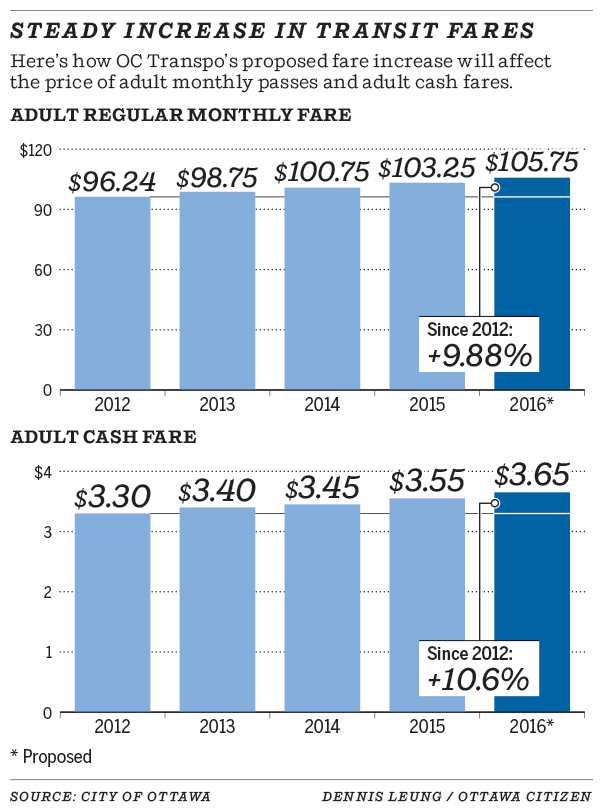
Budget battle comes down to transit fares
OttawaCitizen.com
Dec. 8, 2015
Matthew Pearson
The battle of the budget will be over hiking — or freezing — transit fares next year.
Against the wishes of Mayor Jim Watson and transit commission chairman Stephen Blais, Rideau-Rockcliffe Coun. Tobi Nussbaum planned to ask city council on Wednesday to freeze fares for 2016 and instead increase the transit levy a further 0.9 per cent — a move he says will cost the average homeowner less than $6 next year.
Nussbaum’s premise is simple: Mass disruption in the city’s transit system next year as the result of ongoing construction of the Confederation LRT line is no time to ask OC Transpo riders to pay more.
But Watson and Blais vehemently disagree. They argue the proposed 2.5 per cent average fare increase next year is part of a steady-as-she-goes plan that sees OC Transpo keep up with the added costs of providing bus service without making taxpayers foot more than their share of the bill.
Because transit service disruptions in Ottawa could continue until the second phase of LRT is completed in 2023, they also wonder what happens after 2016.
“Are we freezing them for eight years? You freeze for a couple of years, it’s great politics, but lousy public policy because guess what happens? You have to raise them even higher at the end of the freeze,” Watson said.
Nussbaum says his focus is “entirely on 2016.”
“Let’s see what happens to ridership, let’s see if the federal government comes through on its promise of increased infrastructure funding, let’s see whether disruptions are worse or better than we anticipate — that’s how I plan to answer the question,” the councillor said in an interview.
The first-term councillor signalled his displeasure with the proposed fare hike early on after the budget was tabled last month without a corresponding fare table. When a table was produced last week at the transit commission meeting, Nussbaum’s position solidified.
At $3.55 per ride for adults, he says OC Transpo has the highest cash fare in the country. The adult monthly pass, at $103.25, is second only to the cost of Toronto’s monthly pass.
Meanwhile, ridership has fallen since 2011 and Nussbaum says he’s worried it could fall even further, just as the city hopes to achieve ambitious ridership targets when the Confederation line opens in 2018.
“If we want to get there, we have to hang on to every rider we have,” he said.
The proposed fare increase was projected to generate $2.2 million in added revenue next year. Nussbaum says his plan would be revenue neutral because it proposed collecting the equal amount of money through an increased transit levy.
But taxpayers, says Blais, already contribute millions to public transit every year and shouldn’t be asked to pay more.
The tax base contributes 100 per cent of the cost of transit capital projects and almost half of the annual operating costs (revenue from riders covers the rest). Taxpayers also shelled out $74 million this year for new buses and additional operating costs to lessen the sting of service disruptions.
“Taxpayers have already invested a lot to help subsidize those inconveniences,” Blais said.
Ridership, which was 97.1 million rides last year and is currently on target to hit that same figure this year, has not fallen since the eastern leg of the Transitway was closed on June 28, he said, adding some trips are actually faster now because some buses heading downtown leapfrog some stations.
Questions about future transit fares come as OC Transpo plans to cut dozens of early-morning and late-night bus trips that have low ridership and begin collecting new revenue from the Canadian Tire Centre and Bluesfest for added bus service to special events.
Blais noted that the $4.6 million to be trimmed from OC Transpo’s budget next year is more than double the amount to be collected from the fare increase.
Wednesday could see the most acrimonious budget debate since Watson was elected in 2010.
“I think it has that potential,” said Gloucester-Southgate Coun. Diane Deans when asked if the budget might not pass unanimously. (She and several others, including Nussbaum and Somerset Coun. Catherine McKenney, say they remain undecided about whether they will vote for or against it.)
Although transit may be the main event, Deans and others remain concerned about the city’s plan to cut jobs and offer insufficient support to agencies that serve, as McKenney put it, “our most vulnerable residents.”
Deans, who chairs the community and protective services committee, is expected to ask for $500,000 in one-time funding to help community groups and social service agencies from across the city meet additional demands for their service.
The committee heard from close to 40 public delegations last week, many of whom said the annual funding they receive doesn’t match their rising costs.
“There’s no point having a consultation on a budget if we just don’t listen to what we heard,” Deans said.
A separate motion, expected from Kanata North Coun. Marianne Wilkinson, will ask city staff to provide councillors with more information about positions being eliminated.
About 50 full-time equivalent positions are to be cut from city operations, transit, and public health, but so far only some positions have been identified.

